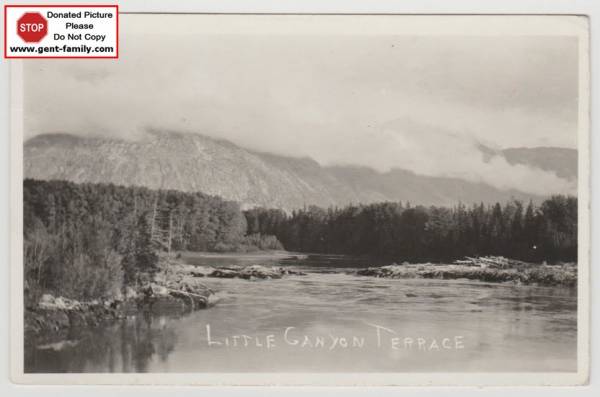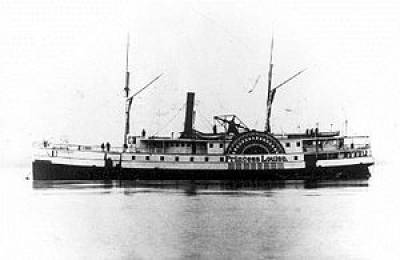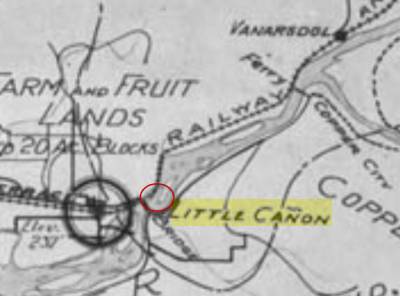
Little Canyon (Sipkiow)
Thornhill, British Columbia, Canada
Little Canyon
alt- Sipkiow, alt- Sip-ki-aw Fall or Rapid
Latitude- 54°31'00“ N
Longitude- 128°33'30” W

Little Canyon, at Thornhill, near Terrace, location of Old Skeena Bridge.
Postcard courtesy Darenn Rieberger
The Government blasted rocks out the channel in this Canyon, to make Sternwheel travel safer through here.
Old Skeena Bridge was located at what historically was called Little Canyon, just upriver from Thornhill's Landing
Some books say, or infer, the Canyon was named after George Little, founder of Terrace, who came to Terrace on snowshoes, via Kitimat-Lakelse Lake trail, in 1905
This sounded very true, as his pre-emption was located very close to this area.
I see Wikipedia, and BC Geo says it was named after Dudley Little, Founder of Terrace? Well he was born in 1914! He was not the founder of Terrace no 1, his Dad was! And now #2, I am positive that one is wrong as well!
My evidence and proof is a newspaper clipping from Sept 8, 1897, that clearly calls it Little Canyon. 8 years earlier!
Not only that, The article shows the Native name- Sipkiow, describing it as 9 miles below Kitselas Canyon, so there is no mistaking this proof.
I now know the meaning it refers to is Little, the opposite of Big!
The “Big Canyon” on the river was the “Kitselas Canyon”,
Another clue- There is a “Little Canyon” on the Stikine, mentioned in late 1800's, in many books.
This same article describes the author (Charles W. D. Clifford) of the article, and 3 “Indians” (as he referred to them in the article),
Went through on snow-shoes, 55 miles, from head of ocean steamboat navigation,
At the Kitimaat Inlet, Up the Valley to the Kitselass Canyon. At Little Canyon, they reported a span of 140 ft, would cross the Skeena River,
and that is where the original Skeena Bridge was placed. He was amazed as to the width, and how level the land was in this valley, for a railroad.
Mr. Clifford ended up buying Thornhill Landing from Tom Thornhill.
1880 Sanford Fleming C.M.G. Engineer-in-Chief of the CPR, wrote a report for the CPR, compiling reports from his men, as they explored the Coast of BC.
George E. Keefer wrote the section concerning the travel up the Skeena, dated Jan 23, 1880, looking for a terminus for the CPR, written about here.
He started his journey in New Westminster with Mr. Cambie and a Mr. McLeod.
He arrived at Port Essington June 5, 1879. they were to persue the idea of Port Simpson as the head of the Railroad, the same as Charles Hays had for the GTPR.
He put a Mr. J. H. Gray in charge of one group, as he proceeded 10 miles further than the trip in 1866 to 73rd mile.
He claimed Kitsumgallum at 72 mile would be the head of Steamboat navigation on the Skeena at that time in 1880.
They travelled on the Hudson's Bay Steamer “Princess Louise” under Captain Lewis, from Port Essington at the mouth of the Skeena, leaving approx Nov 8, (1879?).

Sidewheel Steamer, SS Princess Louise
He referred to a trip the Sternwheel Collins Overland Telegraph Co. Sternwheel Steamer “Mumford” came up the river in 1866, delivering Telegraph Equipment.
They went to the 76th mile, where there was a constraction they referred to as Ksip-kee-agh Falls.
They claimed in low water the falls disappear, with swift current and rocks in the channel, proving a barrier to large boats.
Captain Lewis mentioned above was:
Captain Herbert George Lewis
b- Jan 2, 1828 in Aspeden Hertfordshire, England
d- Mar 30, 1905, at Dayford Villa, 114 Belleville St., in Victoria BC, age 77, Master Mariner
He left home to the sea at age 16. Worked as a midshipman made several voyages from England To India, and China.
1847 he hired on with the HBC and sailed to Victoria on the HBC ship the Cowlitz.
He commanded other famous boats for the HBC, the Beaver, Enterprise, Labouchere and the Otter.
His last command was the Princess Louise in 1886.
In 1869 he returned to England, and in 1870 married Mary Langford, daughter of Edward E. Langford, who came to BC in 1852. (May 1851 in another article)
Her father did not approve of their relationship. They met on the ship “Tory” that brought the Langfords to Esquimalt. He was 2nd mate on the Tory.
He returned to Victoria, and stayed with HBC until 1883.
At one point HBC gave him control of the whole fur trade in Russian Territory (Alaska today)
He piloted the First Steamer through Plumper Pass, which became Active Pass.
He took the H.M.S. Plumper through the pass, and thus it's name.
He then went to work for the Marine Dept of Canada.
1892 made shipping master of the Port of Victoria
Lewis Island named after him.
He attended Cheltenham College, in the West of England.
Member of the I.O.O.F.
His favourite song which he would sing, “God Bless King Bill, Our Sailor King”
He was the son of Edward Lewis Esq., Gentleman Farmer.

